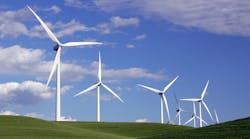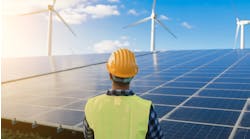When stakeholders speak ESG, 'smart' utilities listen and evolve
The people have spoken when it comes to utilities and environmental, social and governance.
But which people? Customers, for starters. They increasingly expect power providers to generate and distribute energy while meeting ESG guidelines.
Who else? Regulators who increasingly consider ESG metrics in policies dictating performance by domestic utilities large and small. In 2022, the Federal Energy Regulatory Commission in the U.S. issued a significant update to its regulations for utilities, emphasizing the integration of ESG metrics. The FERC update mandates that all electric utilities must include specific ESG performance indicators in their annual reporting. These indicators encompass factors such as greenhouse-gas emission reduction targets, diversity and inclusion initiatives, and community engagement efforts.
This move by FERC highlights the growing importance of aligning utility operations with sustainability and responsible business practices, reinforcing the role of utilities in the broader environmental and societal landscape.
See also: The 'electrification of everything' and microgrids boosting utilities' efficiency
And, finally, the people within utilities themselves are voicing demands for greater focus on ESG strategies—from the man in the C-suite to the woman servicing the transmitter. They recognize the value in cleaner energy, engaging all community stakeholders, and the ways in which ethical governance engenders trust, attracts investment and ensures compliance.
All these parties contribute to massive strategy shifts with utilities in recent years. Consider Pacific Gas and Electric, the utility giant in California that has been investing in renewable energy, including solar and wind projects, to reduce its carbon footprint as part of a commitment to eventually source 100% of its electricity from clean, renewable sources. PG&E’s Corporate Sustainability Report Data Index makes it easy to study their ESG goals and achievements—they publicize them on their website with the labels Performance, People, Planet, Prosperity.
PG&E seemingly is smart to make this data easily accessible; their audience is looking for it. Close attention to ESG policies and programs benefits all current utility stakeholders and the generations that will follow them. A more equitable approach to, say, energy delivery, meets the needs of all customers. And these wins are prompting the utilities sector—which often is resistant to change—to actually evolve.
ESG: The gentle disruptor
The ESG evolution is multifaceted, entailing a shift toward clean energy sources; the disruption of traditional centralized models by distributed-energy resources such as solar panels and microgrids; the integration of artificial intelligence, Internet of Things strategies; and advanced analytics for grid optimization and improved customer engagement.
This ESG evolution recognizes and respects shifting customer demands for tailored services and renewable options. These demands are growing louder among better-informed, environmentally minded, vocal collection of customers, particularly the younger population that speaks with the modern megaphone of social media and other digital tools that can amplify criticism in real time.
When customers speak ESG, utility providers (the smart ones, at least), listen. Just how are they adapting? Here are the most common strategies:
- Utilities evolve regulatory ESG frameworks and mandates: The regulatory landscape for utilities is undergoing profound change. Evolving frameworks and mandates are steering utilities toward sustainable operational approaches. Governments are emphasizing climate change, driving utilities to prioritize renewable energy, curb emissions, and adopt energy-efficient technologies. Reporting transparency, energy-efficiency standards, and social engagement are becoming vital regulatory components. Transparent collaboration among utilities, regulators, and stakeholders is the norm.
- Utilities shift stakeholder expectations and demands: The changing utilities landscape is influenced by shifting stakeholder expectations—customers, investors, employees, communities, and advocacy groups are demanding greater emphasis on sustainability and ESG practices. They've made their voices heard.
- Customers reward socially responsible organizations by speaking with their wallets: Employees do so in their choice of careers. Communities are holding utilities accountable for minimizing environmental impacts, while advocacy groups and NGOs are pushing for stricter standards. Stakeholders also demand transparency, collaborative partnerships with the full audience of customers, and meaningful dialogue about sustainability challenges. Responding to these evolving stakeholder expectations is key for utilities to thrive in the dynamic energy sector.
Utilities align ESG with profitability
This ESG approach can be profitable. I'll say again: ESG can be profitable
Utilities can balance financial objectives with environmental and social considerations, fostering more responsible decision-making. While shifting to ESG policies and mindsets can seem like a chore (and an expensive one), this alignment can prompt long-term value creation, enabling utilities to identify emerging opportunities, manage risks effectively, and build resilience against market changes and regulations, all while appealing to customer demands.
Consider the case of NextEra Energy, a Florida-based utility that has aligned ESG strategies with profitability by prioritizing renewable-energy generation through its subsidiaries, including Florida Power & Light Co. and NextEra Energy Resources.
It’s working. NextEra Energy's commitment to expanding its renewable energy portfolio has not only advanced its sustainability goals, but the company's stock price has surged by 200%, significantly outperforming many of its peers in the traditional-utility sector. This growth has been driven by NextEra Energy's investments in wind and solar energy projects. They have not only secured investments from socially responsible investors, but also attracted environmentally conscious customers seeking sustainable-energy sources.
This combination of financial success and environmental stewardship exemplifies how integrating ESG into business strategies can enhance profitability and set a precedent for the future of utilities. Moreover, incorporating sustainability and ESG factors informs risk-management strategies, such as diversifying energy sources and adapting to climate challenges. That can rescue revenue.
Utilities prioritize renewable energy, clean tech
Utilities are embracing the global shift toward cleaner energy sources like solar, wind, hydro, and geothermal power by diversifying their energy portfolios, reducing carbon emissions, and aiding in the fight against climate change. The integration of renewables, however, demands upgraded grid technologies, smarter energy-storage solutions, and responsive strategies to effectively manage intermittent energy supply.
This transition has given rise to DERs like rooftop solar panels and energy-storage systems. Utilities are adapting by creating new business models and systems to seamlessly integrate and manage these distributed resources, which ultimately fosters grid stability. Simultaneously, technological advancements in solar and wind power, energy storage, smart-grid infrastructure, and digitalization have transformed utilities’ operations, making them more efficient and enhancing customer interactions.
Regulatory and policy support from governments worldwide promotes these strategic shifts, with financial incentives and standards spurring the adoption of renewable energy and clean technologies.
All these collective efforts and motivations are propelling utilities into a dynamic era. By embracing this shift—and even leading the ESG conversation with their customers, employees and wider stakeholders—utilities can contribute to sustainable energy and meet the expectations of their communities.
They can do all of this while tapping into innovative revenue models. That speaks volumes.
Harneet Kaur is the energy and sustainability project manager at HEXstream, a Chicago-based company focused on solving data and analytics-related business problems for utilities and other clients.



